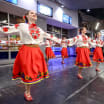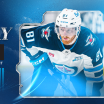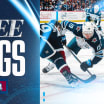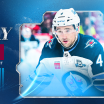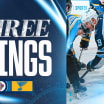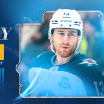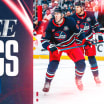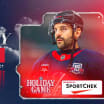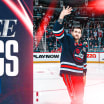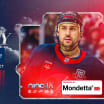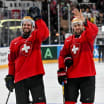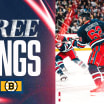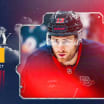Sydney Daniels remembers the moment well.
She was in preschool when she heard her name over the public address system.
"Sydney Daniels, please come to the office."
Her eyes went wide. She hadn't done anything wrong.
Off she went to the office, where she saw her father, Scott, waiting for her.
"My dad picked me up in the middle of the day and was like 'You ready to go skating?'" she recalls. "I was like 'Hell yeah,' although, at that age that's probably not what I said."
The two went to some open ice and, with some figure skaters also making use of the surface, Scott used his 149 games of NHL experience to teach his daughter how to skate.
FEATURE: Sydney Daniels' road to the NHL paved by family and courage
"To think in the last two generations of everything that has got me to this place - it's pretty powerful and overwhelming"
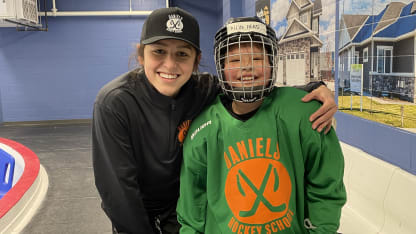
By
Mitchell Clinton
WinnipegJets.com
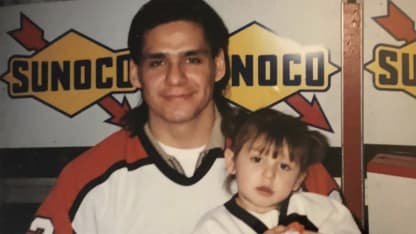
So what is so special about a former NHLer teaching his daughter the game he loved?
Well, two things.
First, after Scott Daniels' NHL career ended due to concussions (after stints with the Philadelphia Flyers, New Jersey Devils, and Hartford Whalers), he had a hard time finding a way to love the game again.
"He had a down period where he was struggling with his mental health and the ramifications that come with athletes not being able to do what they love anymore," said Daniels. "I was persistent as heck with my dad being like 'Dad I want to play hockey. I want to be like you.' He'd say 'No, you'll find a different sport.'"
Her persistence paid off, and it resulted in a memory she'll never forget.
The second part? Her falling in love with the game arguably began two generations earlier. Her grandfather, Noel Daniels, played at St. Michael's residential school - the same place as Fred Sasakamoose, the first Indigenous player to play in the National Hockey League.
"At the back of the book (titled Call Me Indian - From the Trauma of Residential School to Becoming the NHL's First Treaty Indigenous Player), he talks about my grandfather and my dad," Daniels said. "It's been kind of this three-generational thing between my grandfather, my father, and I."
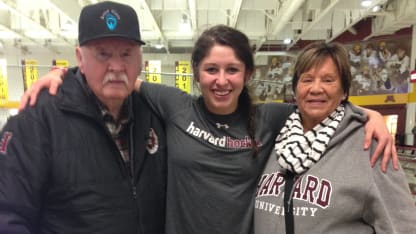
She turned her incredible passion for the game, and her love of her Indigenous heritage, into a hockey resume that boasts playing and coaching at Harvard, a gold medal at the 2011 World Under-18 Tournament and National Aboriginal Youth Championships, and one season with the Boston Pride in the National Women's Hockey League.
It's all led her to where she is now: the first female scout hired by the Winnipeg Jets.
--
While she played her high school hockey with Westminster School in Simsbury, Connecticut, and grew up in Southwick, Massachusetts, Daniels honed her skills on her grandfather's farm in Leask, Saskatchewan.
"He did what he needed to do to make sure his children had the ability to do everything they want to do," Daniels said. "He taught them how to play hockey. Every year he'd build a hockey rink on their farm and teach them the game."
Noel Daniels had five sons and two daughters. One of the daughters passed away shortly after being born, but was given the name 'Tara,' which happens to be Sydney's middle name.
"My grandfather taught all of them how to play and made sure they were able to have opportunities that Indigenous youth weren't given back then - and still today, really aren't given because of disparity in wealth and the systemic racism that's still in play," Daniels said. "In that regard, he was so focused and dead set on giving his children the opportunity to get off the reservation and excel outside of their place."
When Daniels talks about her grandfather, who was also a two-term Chief of Mistawasis (Nehiyawak) First Nations Reservation before passing away due to COVID-19 in 2020, she gets lost in the thought of what he was able to accomplish despite being taken away from his family at the age of six.
He was at St. Michael's residential school until the age of 17.
"He was a very good hockey player. Because of that, he was protected within those schools. He was given proper meals because they'd go travel and play other residential school teams, they would have exhibitions against NHL teams," Daniels said. "Because of the sport, my grandfather was able to survive residential school, have a way out, have a way to be protected, and have a way of 'Hey I love this sport too but if I do well, then I'm going to live. I'm going to be okay.'"
His courage, Sasakamoose's courage, and the courage of those who never made it home, are just part of what makes Daniels who she is.
She returns to Saskatchewan in the summer, along with her dad, to run hockey schools to give back to the game that has given her so much. On top of that, she's played in the Chief Thunderstick tournament - named after Sasakamoose - and on top of being the only female to compete in the all-male event in 2021, she was part of the winning women's squad - Sage Strong - in 2022, the first year that such a division existed.
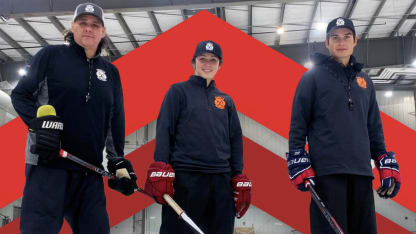
She wore number 42 that year, the same number her grandfather wore when he played. On her team were Olympians (and Manitobans) Brigette Lacquette and Jocelyne Larocque.
Lacquette, who became the first Indigenous woman to play for the Canadian women's hockey team at the Olympics in 2018, remains close friends with Daniels to this day. The two text about how to continue to open doors for Indigenous youth.
"She, in my opinion, is a trailblazer for me to not only want to pursue this but to feel confident," Daniels said of Lacquette, who is a pro scout with the Chicago Blackhawks. "For her to be such a strong Indigenous female as well, we're texting all the time on how we can make a bigger change. It's incredible to see women coming in and I plan to try and work my hardest so people can see it's the same sport."
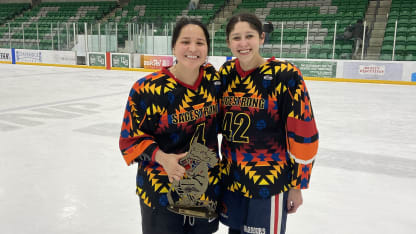
And it's the sport her dad, and her grandfather, have taught her as long as she can remember.
"We quickly morphed into a very strong hockey family," said Daniels. "My dad just fell in love with the game. He wanted to succeed. He was an athlete, a competitor, he wanted to get to where he wanted to go and was willing to take those sacrifices in moving away from home. He had to move away from home and he had to deal with instances of racism consistently, constantly, throughout his career."
--
In 2013, Daniels began her NCAA career at Harvard.
In 2015, Daniels and Harvard won the Beanpot Tournament - an annual event featuring the four major US college hockey schools in the Boston area: Harvard, Boston University, Boston College, and Northeastern.
Over her four years as a player, she scored 59 goals and had 86 points in in 126 games. She was the captain in her final season, which came in 2016-17.
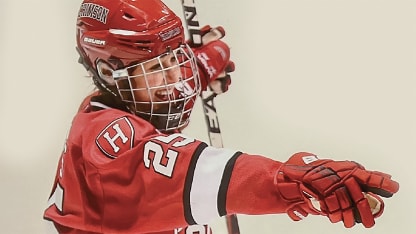
When her time as a student-athlete ended, Daniels was looking at what life might be like after playing.
"I went to Harvard, so I figured I had to be like every other Harvard student and go right into finance and 'I want to make a million dollars,'" she laughed. "But my heart wasn't in it."
So, it was time for a phone call home. She called her mom, Lynn, and told her the cubicle life wasn't for her.
"She apparently was already expecting that phone call, which is a mother's sense," Daniels smiled. "I kind of stumbled back into hockey and started coaching and fell in love with it."
So there she was, back on the Harvard bench, this time as an assistant coach.
Daniels helped Harvard to another Beanpot title in February of 2022, becoming one of the rare people to win the tournament as both a player and a coach.
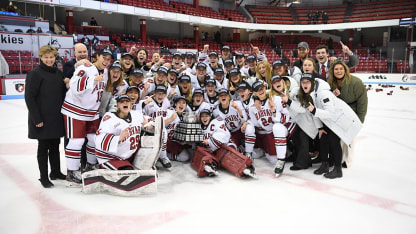
She served as an assistant coach for four years. But before she could start her fifth season, her life was about to change again.
--
It was supposed to be a quick meet-up at a coffee shop outside of Boston. Winnipeg Jets assistant general manager Larry Simmons remembers it well.
"It turned into an hour and a half," Simmons said. "It probably could have kept going if not for a game that I had to get to."
Daniels, who remembers feeling excitement, nerves, and a touch of anxiety the night before the meeting with Simmons, felt an instant "click" in the conversation as the two chatted about the game, and Winnipeg.
"I had been working in the women's game, played four years of college, coached for four and a half years after that, my world has been pretty solid the last nine years," Daniels said. "Meeting someone like Larry, who is a huge figure and role model in this space, the NHL, and having that conversation with him, I left thinking this is something I really want to pursue."
Over several rounds of interviews, Daniels kept rising to the occasion, just as she did when she was a player.
"Her experiences in the game as a player and as a teacher are somewhat similar to that of Mark White and Brian Renfrew who have been in this position for us previously," said Simmons, who was struck by Daniels' enthusiasm from the very start. "She has Canadian roots, so I think the opportunity to work for a Canadian team is extra special for her."
On September 21, 2022, Daniels was officially named a college scout for the Jets, becoming the first female to hold a scouting position with the team.
Her first phone call, just like five years ago when she returned to Harvard, was to her parents.
"Ever since I was little I wanted to be in the NHL," Daniels said. "This might not be the way I planned it in the role, but to be able to call my dad, my mom, and my grandparents and say 'I made it to the show' is a moment I'll never forget."
After that phone call, she got right down to work.
Daniels met with Pete Ratchuk, the Director of Pro Scouting for the Jets, at an event in Buffalo, NY prior to coming to Winnipeg for training camp.
"It's cool to have a new player pool with a different gender," said Daniels, who also did some recruiting work as part of her coaching job at Harvard. "It's very dialed in on players we're looking for and things we're looking for. I'm excited to work with Mark White within in the NCAA. He was a Providence guy. I played in Boston. When I first came on he said 'I'm so happy to have another person at the table fighting for the NCAA!'"
Hard to believe it all started with a resume and a coffee.
"That 90 minutes might have made (Simmons) late," said Daniels. "But it definitely changed my life, whether I ended up in this position or not."
--
There was a time when Daniels was a kid that she saw herself as a hockey player "just like everyone else," as she puts it.
As she grew older, she learned she was much more than that.
"My success is not just mine. My success is for my people, my success is for the youth to see that 'hey, this girl is just like me. She's indigenous just like me and she's doing this? I can do that,'" Daniels said. "I grasped that at an early age because that was something my father really made me conscious of. I'm so thankful for that."
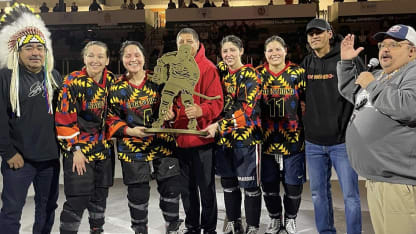
Whether it's through her hockey schools, her numerous texts with Lacquette, or conversations with the people closest to her, Daniels wants to continue to open doors and be an inspiration.
"To think in the last two generations of everything that has got me to this place - it's pretty powerful and overwhelming," she said. "Sometimes I'm just struck in awe of how much has changed in those three generations. It also instills me with this pride, purpose, and gratitude. It motivates me to keep pushing and see how far I can make change, and see how far I can empower youth and indigenous youth, and other people, to keep pushing and keep breaking those systems and try to get them to realize how special they are."


